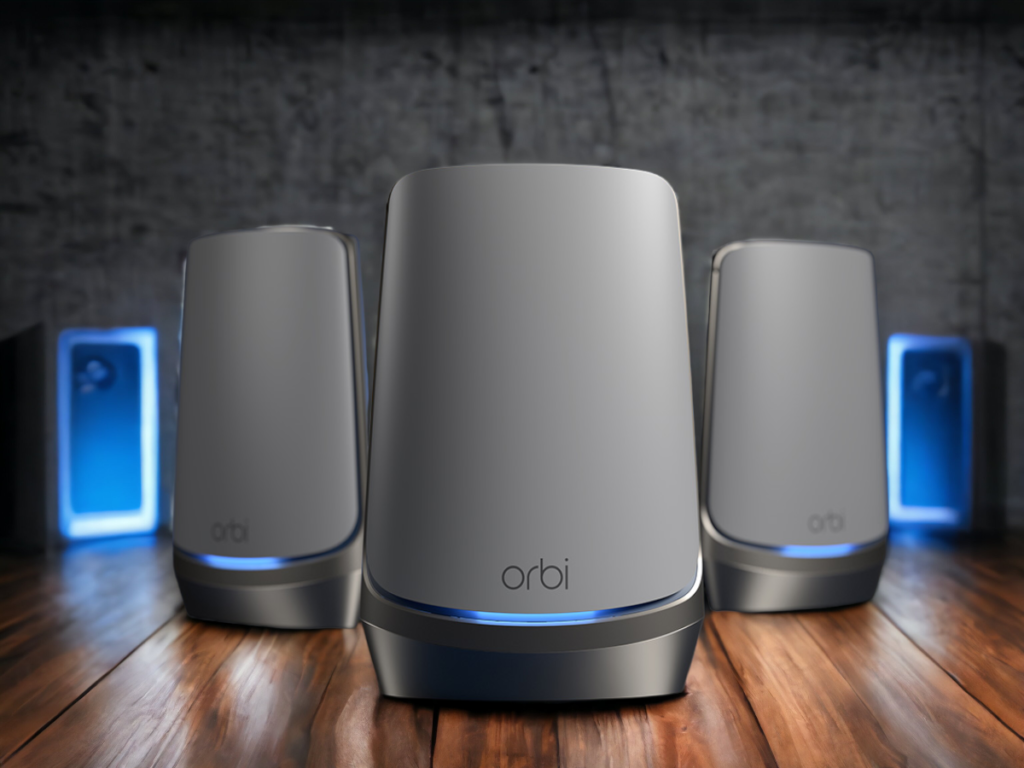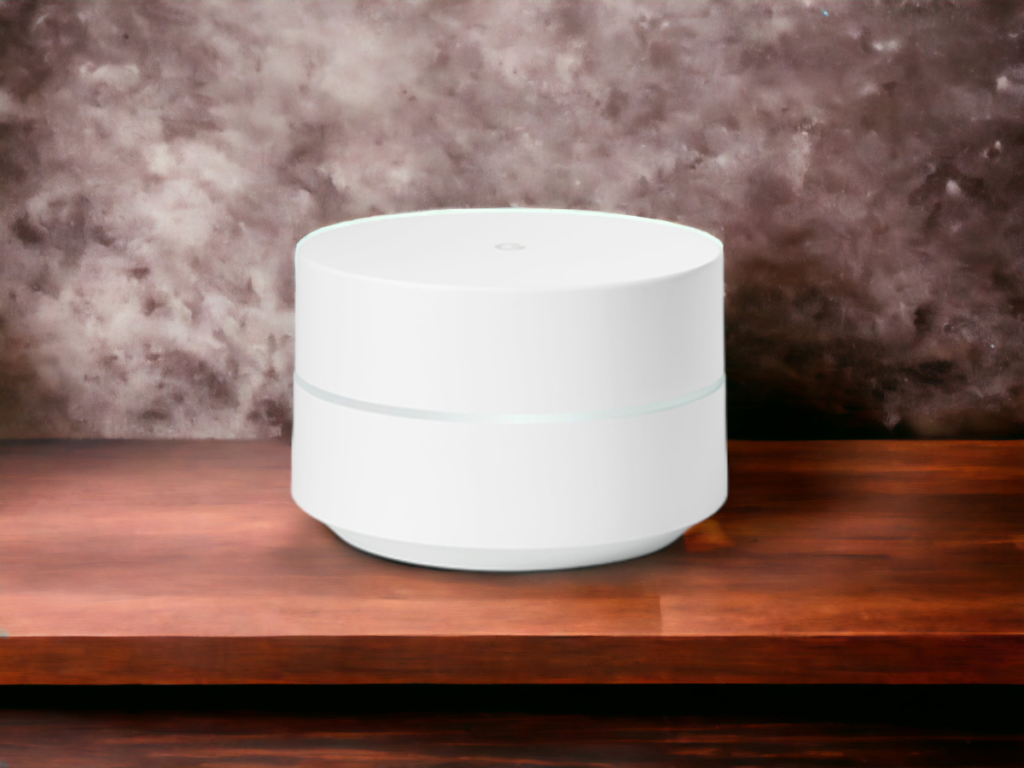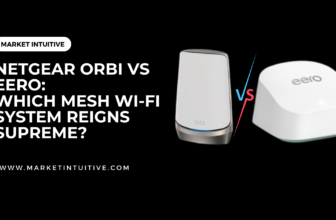Netgear Orbi vs Google WiFi: Which One Is Better For You?

In today’s fast-paced world, having seamless internet connectivity has become a necessity. Over the years, mesh networking systems have made rapid progress and are now the go-to choice for improved Wi-Fi coverage in homes and businesses alike. Two popular options in the mesh networking market are Netgear Orbi vs Google Wifi. But which one is better for you? Let’s find out.
Google Wifi is an accessible and affordable mesh networking solution that’s easy to set up, providing great coverage for small to medium-sized homes. The system is a dual-band setup, offering 867 Mbps speed on the 5GHz radio band, and 300 Mbps on the 2.4GHz radio. On the other hand, Netgear Orbi is a more advanced solution, boasting a tri-band system with a maximum theoretical speed rate of 867 Mbps on the first 5GHz radio band, 1,733 Mbps on the second 5GHz radio band, and 400 Mbps on the 2.4GHz band.
When it comes to Ethernet ports, Netgear Orbi outshines Google Wifi with more options for hard-wired connections. It’s crucial to understand their respective strengths and weaknesses to determine which of these mesh networking systems is best suited for your needs. So let’s dive in and compare the features, performance, and value of Google Wifi and Netgear Orbi.
Netgear Orbi vs Google Wifi

When comparing Netgear Orbi vs Google Wifi, there are several factors to consider. These include coverage, speed, features, and price. Let’s dive into each of these aspects to help you understand the differences between these two popular mesh Wi-Fi systems.
Coverage: Google Wifi offers a coverage range of up to 4,500 square feet when using three units. On the other hand, Netgear Orbi provides a more extensive coverage area of 5,000 square feet with just two units. If you need more range, Netgear Orbi could be a better choice, although both systems can be expanded easily by adding more nodes.
Speed: In terms of speed, Netgear Orbi generally outperforms Google Wifi. Google Wifi nodes are dual-band AC1200 models, with a maximum bandwidth of 1,200 Mbps, while the Netgear Orbi features tri-band technology, reaching up to 400 Mbps on the 2.4GHz radio band and 867 Mbps on the first 5GHz radio band, and 1,733 Mbps on the second 5GHz radio band.
Features: Netgear Orbi offers advanced features and more connectivity options, such as a USB port and more LAN Ethernet ports, making it more suitable for users with multiple wired devices or who require advanced networking features. On the other hand, Google Wifi has a user-friendly app and is generally easier to set up and manage, making it an excellent choice for users who prioritize simplicity.
Price: Google Wifi is generally more affordable than Netgear Orbi. If you don’t require the additional features offered by the Orbi, opting for Google Wifi could save you some money while still delivering reliable Wi-Fi coverage.
In summary, both Netgear Orbi vs Google Wifi have their advantages and disadvantages. If you need better coverage and speed, Netgear Orbi might be the better fit. However, if you’re looking for simplicity, ease of use, and affordability, Google Wifi could be the way to go.
Design and Features
Design Comparison
The Netgear Orbi and Google Wifi are both mesh systems that promise seamless coverage and enhanced wireless performance. In terms of design, the Orbi features a tall, cylindrical shape with a white LED ring on top. In contrast, Google Wifi has a more compact, puck-shaped design with an LED light near the base.
Orbi Features
- Tri-band technology: The Orbi system uses tri-band technology, ensuring optimal coverage and speed by leveraging an additional 5GHz band dedicated to communication between the router and satellite.
- Ethernet ports: With the Orbi system, you get more ports for wired connections – two on the satellite nodes and four on the main router. This is useful if you need to connect multiple devices or prefer a hardwired setup.
- Parental controls: Netgear’s Orbi comes with advanced parental control features, allowing you to manage access, filter content, and set time limits for individual devices.
- Guest network: The Orbi system supports setting up a separate, secure guest network, keeping your main network private and secure.
- Smart home integration: The Orbi system can be easily integrated with various smart home platforms, offering more control and convenience.
Google Wifi Features
- Dual-band technology: Google Wifi uses a dual-band system, ensuring decent coverage and speed across connected devices. While it may not provide as much bandwidth as the Orbi’s tri-band system, it’s still a reliable choice for most home users.
- Ethernet ports: Each node in the Google Wifi system is equipped with the same number of ports – two Ethernet ports, one for the internet and the other for local area network connections.
- Parental controls: Google Wifi provides basic parental control features, allowing you to pause Wi-Fi access and schedule downtime for devices.
- Guest network: Similar to the Orbi system, Google Wifi also supports creating a separate guest network for visitors or separating specific devices from your main network.
- Smart home integration: Google Wifi can be integrated with other Google devices like Google Home or Home Mini, offering voice control and automation capabilities.

Performance and Range
In this section, we will compare the performance and range of Netgear Orbi vs Google Wifi mesh systems. Both systems aim to deliver reliable Wi-Fi coverage throughout your home, but they have some differences in terms of speed and coverage capabilities.
Orbi Performance
Netgear Orbi is a tri-band Wi-Fi system, which gives it a significant edge in terms of performance. It has an AC3000 speed rating, which is higher than Google Wifi’s rating. One of the main advantages of Orbi’s tri-band system is the dedicated backhaul channel that connects the router and satellite devices. This backhaul channel operates on a separate 5 GHz band and ensures that there’s minimal signal interference and maximum speed between the devices.
In real-world testing, Orbi has shown impressive results. The router achieves speeds of up to 480 Mbps, while the satellite delivers around 470 Mbps. At a distance of 30 feet, the Orbi router still manages to deliver 223 Mbps, and the satellite maintains 220 Mbps. This performance and range capability make Orbi one of the best mesh Wi-Fi systems available in the market.
Google Wifi Performance
Google Wifi is a dual-band Wi-Fi system, which means it operates on two frequency bands: 2.4 GHz and 5 GHz. While its performance is quite decent, it doesn’t quite measure up to the speeds of the Netgear Orbi system. The lack of a dedicated backhaul channel means that the communication between router and satellite devices might experience some signal interference, leading to reduced speeds.
However, Google Wifi still offers good coverage and solid performance at a lower price point. Most tests have shown that you can get three Google Wifi devices for roughly the same price as two Netgear Orbi devices. So, if you’re on a budget and are not looking for top-tier performance, Google Wifi might be a suitable option for you.
In conclusion, both mesh Wi-Fi systems, Netgear Orbi vs Google Wifi, have their strengths in terms of performance and range. Orbi’s tri-band system and dedicated backhaul channel give it an edge in speed and reliability, while Google Wifi’s dual-band system provides good performance at a more affordable price.
Setup and App

Orbi Setup
Setting up the Netgear Orbi is fairly straightforward. Begin by connecting the main Orbi router to your modem, then place the satellite node in a central location in your home. The Orbi system utilizes a dedicated device-to-device signal to communicate between the router and satellite, ensuring a reliable connection with minimal dead zones.
The Orbi app, available on both iOS and Android devices, guides you through the entire process, making it easy even for those not familiar with Wi-Fi mesh systems. With the app, you can also monitor your home network, control access to specific devices, and remotely access your network when away from home.
Some features of the Orbi app include:
- Step-by-step setup guidance
- Device management options
- Network traffic monitoring
- Parental controls
Google Wifi Setup
Google Wifi offers a similarly simple setup experience. To start, download the Google Wifi app on your iOS or Android device, and connect your first Google Wifi point to your modem. Place additional Wifi points throughout your home, ensuring they are within range of each other, to create a mesh network that eliminates dead zones.
To set up each point, simply scan the QR code on the bottom of the device using the app, and follow the on-screen instructions to name your network and set a password. The app takes care of the rest, configuring your network automatically, and optimizing for the best performance.
Some notable features of the Google Wifi app include:
- Easy QR code scanning for device setup
- Automatic network optimization
- Wi-Fi usage insights
- Family Wi-Fi settings (scheduling and pausing access)
Both Orbi and Google Wifi provide user-friendly apps that make setting up and managing your home network a breeze. While their features may differ slightly, both systems aim to eliminate dead zones and offer reliable Wi-Fi coverage throughout your home.
Pricing and Verdict
When comparing Google Wifi vs Netgear Orbi, pricing is an essential factor to consider. Google Wifi is priced at around $100 for a single pack and roughly $256 for a 3-pack. Each unit can cover 1,500 square feet, making them suitable for smaller apartments and average-sized houses.
On the other hand, Netgear Orbi comes with a slightly higher price. The Orbi RBK753 is available for approximately $599.99. This system is a tri-band mesh WiFi 6 system, offering advanced features and better performance compared to Google Wifi. However, for this additional cost, you may expect increased coverage and enhanced speed.
Concerning the verdict, your choice between Google Wifi and Netgear Orbi comes down to your specific requirements:
- Google Wifi could be better for you if you are looking for an affordable, simple-to-use, and easy-to-set-up mesh networking solution. Its dual-band system (2.4 GHz and 5 GHz signals) is suitable for smaller apartments or average-sized homes, and it has been praised for its performance and reliability.
- Netgear Orbi might be more suitable for those who need a more powerful and advanced mesh networking system. With its tri-band technology and support for WiFi 6, it offers an improved range, better speed, and enhanced performance. Orbi is recommended for larger homes or users who demand high-speed and stable internet connectivity.
In summary, Google Wifi and Netgear Orbi both have their advantages and disadvantages. Google Wifi stands out because of its simplicity, affordability, and ease of use, while Netgear Orbi provides a more advanced and powerful networking experience at a slightly higher cost.
Extras and Compatibility
When comparing Netgear Orbi vs Google Wifi, it’s essential to consider their extras and compatibility features to make an informed decision.
Firstly, let’s discuss their router specs. Netgear Orbi is a tri-band system, which means it broadcasts two 5 GHz signals and one 2.4 GHz signal. On the other hand, Google Wifi is a dual-band system, so it only broadcasts one 5 GHz signal and one 2.4 GHz signal. The tri-band system of the Orbi can provide better performance in terms of range and signal strength.
Next, we’ll look at LAN ports. Netgear Orbi comes with more Ethernet ports, offering two on satellite nodes and four on the main router. This means that you can connect more wired devices to your network. Google Wifi nodes have fewer Ethernet ports, which may be a limiting factor for some users.
On the topic of security and network management, both systems offer guest account features. This allows you to create separate Wi-Fi access for your guests, ensuring they can only access specific parts of your network. Additionally, both Orbi and Google Wifi provide options for parental controls and device management through their respective apps.
In terms of extras, Netgear Orbi provides a few more advanced options for users who need them. This includes email notifications for network issues and integration with Amazon Alexa for voice control. Google Wifi, however, lacks the email notification feature and has limited Amazon Alexa integration.
As for cloud services, both systems require you to link your router to their respective cloud accounts. This means that some of your data will be stored on their cloud servers, but each company ensures to maintain security and privacy.
In summary, the extras and compatibility features of Netgear Orbi vs Google Wifi come down to individual preferences and requirements:
- Netgear Orbi: Tri-band system, more Ethernet ports, advanced features, and better Amazon Alexa integration
- Google Wifi: Dual-band system, fewer Ethernet ports, and more straightforward user experience
It’s crucial for potential buyers to weigh the importance of these factors according to their specific needs before making a decision.






